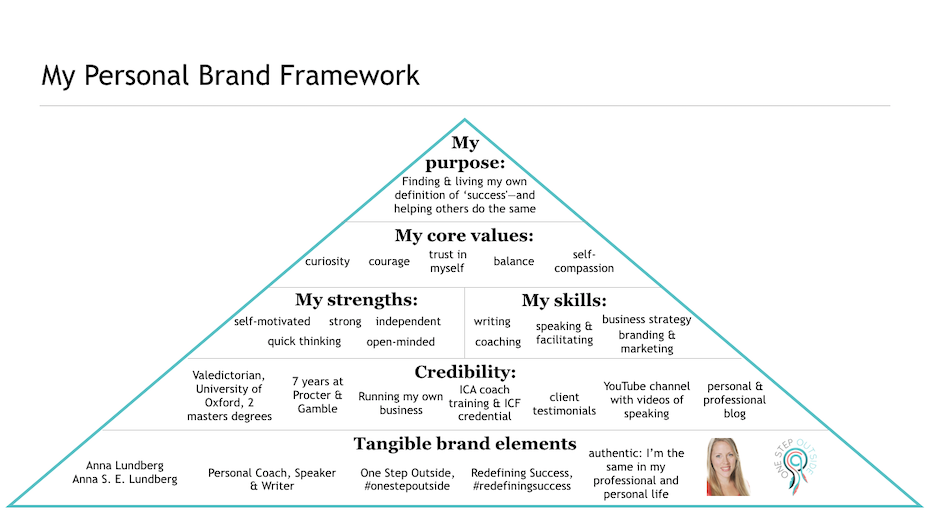How to Build a Personal Brand That Gets You Noticed

1️⃣ Define your personal brand
What do you want to be known for? What are your unique skills and experiences? Once you know your brand, you can start to create content and share your expertise with the world. (💡💡💡)
2️⃣ Create high-quality content
This could include blog posts, articles, videos, or social media posts. Make sure your content is informative, engaging, and relevant to your target audience. (🎥🎥🎥)
3️⃣ Be consistent
Publish new content on a regular basis to stay top-of-mind with your audience. (🗓️🗓️🗓️)
4️⃣ Promote your content
Share your content on social media, guest post on other blogs, and reach out to journalists and bloggers. (🗣️🗣️🗣️)
5️⃣ Build relationships
Engage with your audience on social media, attend industry events, and connect with people who share your interests. (🤝🤝🤝)
In today's hyper-connected world, building a personal brand isn't just for celebrities and influencers. It's a powerful tool that can help professionals from all walks of life stand out, attract opportunities, and advance their careers.
- 80% of consumers trust recommendations from people they know. (🤝🤝🤝)
- 63% of consumers are more likely to buy from a brand they trust. (💯💯💯)
- 93% of marketers say that content marketing is an effective way to reach their target audience. (🎥🎥🎥)
- 70% of B2B buyers consume content before making a purchase decision. (💡💡💡)
- 43% of marketers say that social media is their most effective channel for marketing content. (🗣️🗣️🗣️)

Whether you're a job seeker, an entrepreneur, or a seasoned professional looking to make a mark, crafting a personal brand that gets you noticed is essential. In the below comprehensive guide, we'll explore the steps (in details) to building an impactful personal brand that sets you apart from the crowd.
1. Understanding Personal Branding
Personal branding is the process of creating and maintaining a distinct and consistent image of yourself in the minds of others. It's how people perceive you, what you're known for, and the value you bring to the table. Your personal brand reflects your skills, expertise, personality, and the unique qualities that make you, well, you.
2. Identifying Your Unique Value
Before you can build a personal brand, you must first identify what makes you unique. What are your strengths, skills, and experiences that set you apart from others? Understanding your unique value proposition is the foundation of effective personal branding.
3. Defining Your Brand's Core Message
Your personal brand should convey a clear and compelling message to your target audience. What do you want people to know about you? What do you want to be recognized for? Your core message should be authentic and aligned with your values.
4. Creating a Strong Online Presence
In the digital age, your online presence is often the first impression people have of you. It's crucial to have a professional and consistent online presence across platforms like LinkedIn, personal websites, and social media profiles.
5. Leveraging Social Media for Brand Building
Social media platforms are powerful tools for personal branding. Choose the platforms where your target audience is most active and share valuable content, engage with your audience, and showcase your expertise.
6. Content Creation and Sharing
Content is king in the world of personal branding. Regularly create and share content that aligns with your brand's message. This can include articles, blog posts, videos, podcasts, and more.
7. Networking and Building Relationships
Building a personal brand also involves building meaningful relationships. Network with professionals in your industry, attend events and engage in conversations that demonstrate your expertise and thought leadership.
8. Showcasing Your Expertise
Position yourself as an expert in your field by sharing your knowledge and insights. Offer solutions to common problems, speak at conferences, or host webinars to showcase your expertise.
9. Measuring and Adapting Your Branding Efforts
Track the impact of your personal branding efforts. Monitor your online presence, engagement metrics, and feedback from your network. Adapt your strategy based on what's working and what's not.
Your Personal Brand Journey
Building a personal brand is an ongoing journey that requires dedication and consistency. It's an investment in your professional future that can open doors to exciting opportunities, career growth, and personal fulfillment.
In conclusion, your personal brand is a powerful asset that can propel your career forward. By following the steps outlined in this guide and staying committed to building and nurturing your brand, you can create a reputation that gets you noticed in a crowded and competitive world.
So, are you ready to take the first step in building a personal brand that opens doors and creates opportunities? Start your personal branding journey today, and watch as you become the go-to expert in your field.
Remember, your personal brand is not just about what you say; it's about what you do, how you make people feel, and the lasting impression you leave. So, go out there and make your mark on the world!
Ready to put your newly crafted personal brand to work? Join Joba Network now and explore job opportunities that align with your unique brand identity. Your dream career awaits!
Frequently asked questions
No, some industries like health care and manufacturing require physical presence. But many fields, especially in tech and marketing, are well-suited for remote work.
Not necessarily. Many remote jobs offer competitive salaries and benefits.
There are various job boards dedicated to remote work, such as We Work Remotely and Remote OK.
The key is to set a routine, create a dedicated workspace, and use productivity tools to stay on track.
Tools like Slack, Zoom, and Asana are invaluable for remote work, aiding in communication and project management.




